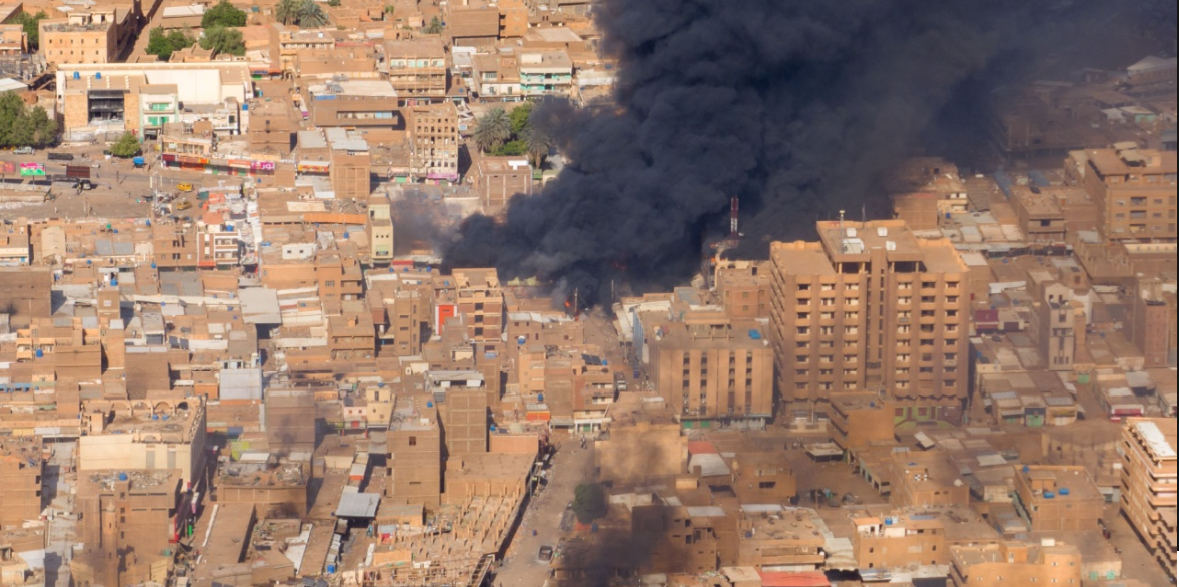CALLING AMERICA-Don’t Let Sudan Become Africa’s Afghanistan.

The international community must not let the Sudanese civil war lead to the chaos that turned Afghanistan into a base for global jihad during the 1990s.
"Brotherhood, UAE, Turkey and China are turning Sudan and South-Sudan into Afghanistan"
Although the Sudanese capital, Khartoum, is now under the control of General Abdel Fattah al-Burhan’s Sudanese Armed Forces (SAF), the rival Rapid Support Force (RSF), led by General Mohamed Hamdan Dagalo, “Hemedti,” controls the western parts of Sudan. The RSF regained control of North Darfur’s capital city, Al Fasher, last month, amid allegations of perpetrating a massacre of civilians.

Without a ceasefire and internationally supported negotiations for a broad-based government, Sudan could remain mired in prolonged strife. While Burhan has the support of Islamist fighters belonging to the Muslim Brotherhood, Hemedti can be expected to continue seeking support from tribal allies, anti-Islamist Sudanese, and external backers.
The situation is similar to the inattention by the rest of the world to Afghanistan after the Soviet withdrawal in 1989. That resulted in the rise of the Taliban, who offered a haven to Al Qaeda, paving the way for the 9/11 attacks on the United States. After protracted wars, Al Qaeda and its nihilist offshoot ISIS appear degraded for now. But extremist forces in the Muslim world have a history of resuscitating themselves in other forms and different theatres.
Extremist Islamism continues to be a global security concern, and allowing Sudan to become a new Jihadi bridgehead would be a strategic mistake. An Al Qaeda affiliate is already poised for territorial gains and a possible takeover of Mali, in West Africa.
It is not a coincidence that Al Qaeda (literally “the base”) tried to establish itself first in Sudan in the early 1990s before finding a home in Afghanistan. Both Sudan and the Afghanistan-Pakistan border region had experienced jihad against European powers, resulting in short-lived Islamic states in relatively recent times.
The roots of Sudan’s internal failures-years of political dysfunction, ineffective governance, and military rivalries—that instigated the current conflict between the Sudanese Armed Forces (SAF) and the Rapid Support Forces (RSF) go back to the 1989 military coup masterminded by Muslim Brotherhood ideologue Hassan Al-Turabi, which brought to power General Omar Hassan Al-Bashir.
Mr. Turabi lost out in an internal power struggle to General Al-Bashir, who was ousted from power after mass protests in 2019. But Islamist radicals remain a significant factor in Sudan’s conflict. To oust the RSF from Khartoum, SAF sought the support of thousands of former intelligence operatives from General Al-Bashir’s regime.
It is an alliance like the one General Al-Bashir formed with Mr. Turabi. In an encounter in Islamabad in 1994, Mr. Turabi had told me that ambitious generals seeking power could be perfect partners for Islamists. “Their ambition needs ideological cover and we, the Islamists, need a shortcut to power to realize the dream of an Islamic state,” he said. Sudan paid dearly for the Islamist alliance with an ambitious general decades ago. It could happen again this time.
SAF’s Islamist partnership could risk making Sudan an operating base for extremist networks targeting North Africa and vital maritime trade routes of the Red Sea. It would also sabotage Sudan’s path toward normalization under the Abraham Accords. General Burhan, a signatory to the accords, has been sanctioned by the United States. And both SAF and RSF have been accused of indiscriminate attacks, targeting civilians, blocking humanitarian assistance, and engaging in systematic human rights violations.
General Burhan’s success in retaking Khartoum has tempted him to pursue military victory. His government has blamed the United Arab Emirates (UAE) for continuing the civil war by supporting his rival. But that alone does not explain Sudan’s internal failures and only diverts attention from Burhan’s alliance with Islamists.
The two-year civil war and the varying fortunes of the two sides have shown that the conflict in Sudan will not end by military means alone. Sudan is ethnically and geographically complex, and its civil war could go on for years as the two major factions fight to take over various parts of the country. Protracted civil war could make Sudan another failed state, like Yemen, dominated by radical factions, or leave it split like Libya, which has been effectively divided between two governments since its own civil war.
Sudan’s further collapse or breakup would have a significant impact on Ethiopia, Chad, South Sudan, and the Horn of Africa. It would impact Africa and the Middle East and could have unintended consequences much like those of the Taliban’s rise in Afghanistan leading up to 9/11. The UN, the United States, and the European Union, as well as Arab and African nations, need to help avert that disaster.
The international community should call for an immediate, unconditional ceasefire in Sudan to prevent total state collapse. Talks about the formation of a broad-based government in Khartoum should follow this. Continuing hostilities will only increase the human cost and create a power vacuum that extremist groups will inevitably exploit. With the SAF entrenched in the capital and the RSF in control of Al Fashir, the competing factions could be encouraged to engage in political negotiations. It might be a good moment for President Trump to use his influence and let diplomacy, rather than endless conflict, settle Sudan’s future.
- Questions and Answers
- Opinion
- Motivational and Inspiring Story
- Technology
- Live and Let live
- Focus
- Geopolitics
- Military-Arms/Equipment
- Segurança
- Economy
- Beasts of Nations
- Machine Tools-The “Mother Industry”
- Art
- Causes
- Crafts
- Dance
- Drinks
- Film/Movie
- Fitness
- Food
- Jogos
- Gardening
- Health
- Início
- Literature
- Music
- Networking
- Outro
- Party
- Religion
- Shopping
- Sports
- Theater
- Health and Wellness
- News
- Culture

